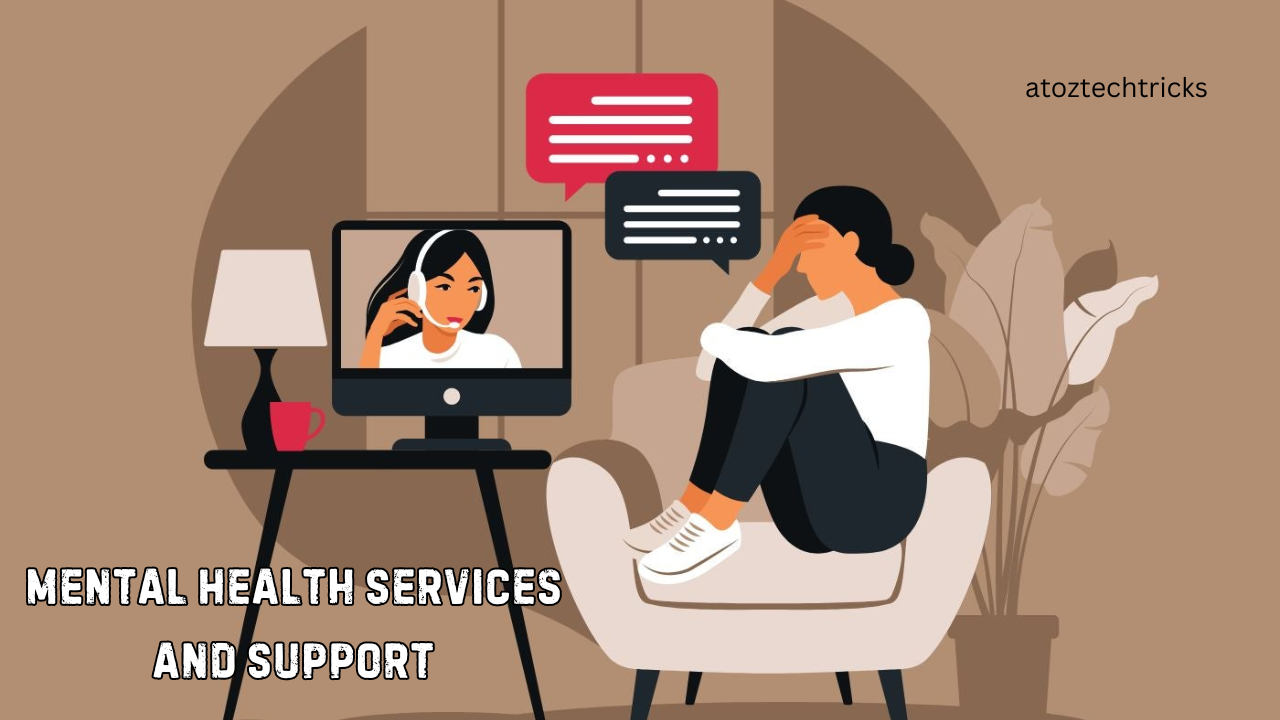Mental Health Services and Support: A Comprehensive Guide
In recent years, mental health has become a focal point of public discourse, with growing awareness about the importance of mental well-being. This shift has led to an increased demand for mental health services and support. Despite this progress, many people still struggle to access the help they need. This article delves into the various types of mental health services available, the importance of seeking support, and the barriers that individuals often face in accessing care.
The Importance of Mental Health Services
Mental health services play a critical role in maintaining the psychological and emotional well-being of individuals. Just as physical health services are essential for treating illnesses and preventing diseases, mental health services are vital for diagnosing, treating, and preventing mental disorders.
Early Intervention
Early intervention is key in addressing mental health issues before they become severe. Mental health services provide crucial support in the early stages of a disorder, which can significantly improve outcomes. By seeking help early, individuals can often manage their symptoms more effectively and prevent the progression of the disorder.
Reducing Stigma
Access to mental health services also plays a crucial role in reducing the stigma associated with mental illness. When people have access to the support they need, it normalizes the act of seeking help and promotes a culture of understanding and empathy. This, in turn, encourages others to seek help without fear of judgment.
Improving Quality of Life
Mental health services can dramatically improve the quality of life for those struggling with mental health issues. Effective treatment and support can help individuals manage their symptoms, regain control of their lives, and achieve their personal and professional goals.
Types of Mental Health Services
There are various types of mental health services available, catering to different needs and preferences. These services range from preventive care to crisis intervention and long-term support.
1. Counseling and Psychotherapy
Counselling and psychotherapy are among the most common forms of mental health treatment. These services involve talking with a mental health professional to explore thoughts, feelings, and behaviors, and to develop coping strategies.
- Individual Therapy: This one-on-one therapy focuses on the individual’s specific needs and concerns. It can be used to treat a wide range of mental health issues, including anxiety, depression, and trauma.
- Group Therapy: Group therapy involves one or more therapists working with a small group of individuals who share similar issues. This format can be particularly effective for those who benefit from peer support and shared experiences.
- Family Therapy: Family therapy involves working with families to address issues that affect the entire family unit. This type of therapy can be particularly beneficial in cases of substance abuse, eating disorders, and communication problems.
- Cognitive Behavioral Therapy (CBT): CBT is a widely used therapy that focuses on identifying and changing negative thought patterns and behaviours. It is often used to treat anxiety, depression, and other mood disorders.
2. Psychiatric Services
Psychiatric services involve the diagnosis and treatment of mental health disorders by a psychiatrist or a medical doctor who specializes in mental health. These services may include medication management, as well as other forms of treatment.
- Medication Management: Psychiatrists can prescribe medications to help manage symptoms of mental health disorders. Common medications include antidepressants, anti-anxiety medications, mood stabilizers, and antipsychotics.
- Electroconvulsive Therapy (ECT): ECT is a medical treatment used primarily for severe depression that has not responded to other treatments. It involves sending small electrical currents through the brain to trigger a brief seizure, which can lead to improvements in mood.

3. Crisis Intervention
Crisis intervention services are designed to provide immediate assistance to individuals experiencing a mental health crisis. These services are crucial in preventing harm and stabilizing the individual until longer-term care can be arranged.
- Hotlines and Helplines: Mental health hotlines and helplines provide immediate support to individuals in crisis. These services are typically available 24/7 and can offer counselling, information, and referrals to other services.
- Mobile Crisis Teams: Mobile crisis teams consist of mental health professionals who can respond to mental health emergencies in the community. They provide on-site assessment, intervention, and support.
- Crisis Stabilization Units: These are short-term, inpatient facilities designed to stabilize individuals in crisis. They provide intensive care and monitoring until the individual is ready to transition to less intensive services.
4. Inpatient and Residential Treatment
Inpatient and residential treatment programs provide intensive, round-the-clock care for individuals with severe mental health disorders. These programs are typically more structured and supportive than outpatient services.
- Inpatient Psychiatric Hospitals: These hospitals provide short-term, intensive care for individuals experiencing acute mental health crises. Treatment typically includes medication management, therapy, and support from a multidisciplinary team.
- Residential Treatment Centers: Residential treatment centres offer long-term care in a structured environment. These centres provide a range of therapeutic services, including individual and group therapy, medication management, and life skills training.
5. Community-Based Services
Community-based mental health services are designed to support individuals in their communities. These services are often more accessible and can provide ongoing support to help individuals manage their mental health.
- Case Management: Case managers work with individuals to coordinate their care and connect them with necessary services, such as housing, employment, and medical care.
- Assertive Community Treatment (ACT): ACT is an intensive, team-based approach to care for individuals with severe mental illness. The team provides a range of services, including therapy, medication management, and support with daily living skills.
- Peer Support: Peer support services involve individuals with lived experience of mental health issues providing support and guidance to others. This can be an effective way to connect with others who understand what they are going through.
6. Online and Telehealth Services
With the rise of digital technology, online and telehealth services have become increasingly popular. These services offer convenience and accessibility, making it easier for individuals to receive the care they need.
- Online Therapy: Online therapy involves video or chat-based sessions with a licensed therapist. This can be a convenient option for those who prefer to receive therapy from the comfort of their own home.
- Mental Health Apps: There are numerous mental health apps available that offer a range of services, from meditation and mindfulness exercises to mood tracking and cognitive behavioural therapy exercises.
Mindfulness and Wellness Retreats: A Path to Rejuvenation and Inner Peace
Barriers to Accessing Mental Health Services
Despite the availability of mental health services, many individuals face significant barriers to accessing the care they need. These barriers can be financial, logistical, or cultural, and they often prevent individuals from receiving timely and effective treatment.
1. Financial Barriers
One of the most significant barriers to accessing mental health services is cost. Many people cannot afford the high costs associated with therapy, medication, and other forms of treatment. Even with insurance, copays and deductibles can be prohibitively expensive.
- Lack of Insurance Coverage: Many insurance plans do not provide adequate coverage for mental health services. This can make it difficult for individuals to afford the care they need.
- High Cost of Services: Therapy sessions, psychiatric appointments, and medications can be expensive, particularly for those without insurance or with high deductibles.
2. Stigma and Discrimination
Stigma and discrimination associated with mental illness remain significant barriers to accessing care. Many people fear being judged or discriminated against if they seek help, which can prevent them from reaching out for support.
- Cultural Stigma: In some cultures, mental illness is highly stigmatized, leading individuals to avoid seeking help. This can be particularly true in communities where mental health issues are seen as a sign of weakness or a personal failing.
- Workplace Discrimination: Fear of discrimination at work can also prevent individuals from seeking help. Many people worry that disclosing a mental health issue could impact their job security or career advancement.
3. Logistical Barriers
Logistical barriers, such as lack of transportation, long wait times, and geographic location, can also prevent individuals from accessing mental health services.
- Lack of Transportation: For individuals in rural or underserved areas, lack of transportation can be a significant barrier to accessing care. Without reliable transportation, it can be difficult to attend therapy sessions or psychiatric appointments.
- Long Wait Times: In many areas, there is a shortage of mental health professionals, leading to long wait times for appointments. This can delay treatment and worsen symptoms.
- Geographic Location: Individuals living in rural or remote areas may have limited access to mental health services. This can make it difficult to find a provider or to receive specialized care.
4. Lack of Awareness and Education
Lack of awareness and education about mental health issues and available services can also prevent individuals from seeking help. Many people do not know where to turn for help or may not recognize the signs of a mental health issue.
- Lack of Knowledge About Services: Many people are unaware of the mental health services available to them. This can prevent them from seeking help or knowing where to turn in a crisis.
- Misunderstanding of Mental Health Issues: There is often a lack of understanding about mental health issues, leading individuals to downplay their symptoms or dismiss the need for treatment.
The Role of Support Networks
Support networks play a crucial role in helping individuals manage their mental health. These networks can include family, friends, peers, and professionals who provide emotional, social, and practical support.
1. Family and Friends
Family and friends are often the first line of support for individuals struggling with mental health issues. They can provide emotional support, help with daily tasks, and encourage individuals to seek professional help.
- Emotional Support: Having someone to talk to and lean on during difficult times can be incredibly comforting. Family and friends can provide a listening ear, offer reassurance, and help reduce feelings of isolation.
- Practical Support: Family and friends can also provide practical support, such as helping with daily tasks, attending appointments, or assisting with medication management.
- Encouragement to Seek Help: Often, family and friends are the ones who encourage individuals to seek professional help. They can help recognize the signs of a mental health issue and provide the motivation needed to seek treatment.
2. Peer Support
Peer support involves individuals with lived experience of mental health issues providing support and guidance to others. This can be an invaluable source of understanding and empathy, as peers can relate to what the individual is going through.
- Shared Experience: Peers can offer a unique perspective based on their own experiences with mental health issues. This can help individuals feel less alone and more understood.
- Empathy and Understanding: Peers can provide empathy and understanding in a way that others may not be able to. They can offer practical advice and coping strategies based on their own experiences.
3. Professional Support
Professional support from therapists, counsellors, and other mental health professionals is crucial for individuals struggling with mental health issues. These professionals can provide the necessary treatment and guidance to help individuals manage their symptoms and improve their quality of life.
- Therapeutic Support: Therapists and counsellors can provide a safe space for individuals to explore their thoughts and feelings, develop coping strategies, and work through their issues.
- Medical Support: Psychiatrists and other medical professionals can provide medication management and other medical interventions to help manage symptoms and improve mental health.
Health Food and Beverage Brands: Pioneers of Wellness in the Modern Market
The Future of Mental Health Services
The future of mental health services is likely to be shaped by ongoing advances in technology, increased awareness, and a greater focus on accessibility and inclusivity. As mental health continues to gain recognition as a critical component of overall well-being, there is hope that more individuals will have access to the care and support they need.
1. Advances in Technology
Advances in technology are already transforming the way mental health services are delivered. Telehealth, online therapy, and mental health apps are making it easier for individuals to access care from the comfort of their own homes.
- Telehealth and Online Therapy: The rise of telehealth and online therapy has made mental health services more accessible to individuals in remote or underserved areas. These services can also reduce the stigma associated with seeking help, as individuals can receive care privately and conveniently.
- Mental Health Apps: Mental health apps offer a range of tools and resources to help individuals manage their mental health. These apps can provide everything from mindfulness exercises and mood tracking to cognitive behavioural therapy exercises.
2. Increased Awareness and Education
Increased awareness and education about mental health are crucial for reducing stigma and encouraging individuals to seek help. Public awareness campaigns, mental health education in schools, and workplace initiatives are all helping to raise awareness and promote understanding.
- Public Awareness Campaigns: Public awareness campaigns can help reduce stigma and encourage individuals to seek help. These campaigns can also provide information about available services and resources.
- Mental Health Education: Mental health education in schools can help young people understand the importance of mental health and recognize the signs of a mental health issue. This can encourage early intervention and reduce the likelihood of severe mental health issues later in life.
3. Focus on Accessibility and Inclusivity
As mental health services continue to evolve, there is a growing focus on making these services more accessible and inclusive. This includes addressing financial barriers, reducing stigma, and ensuring that services are available to all individuals, regardless of their background or circumstances.
- Addressing Financial Barriers: Efforts to make mental health services more affordable and accessible are crucial for ensuring that all individuals can receive the care they need. This may include expanding insurance coverage, offering sliding scale fees, and increasing funding for public mental health services.
- Reducing Stigma: Continued efforts to reduce the stigma associated with mental illness are essential for encouraging individuals to seek help. This includes promoting understanding and empathy, as well as challenging stereotypes and misconceptions.
- Ensuring Inclusivity: Mental health services must be inclusive and responsive to the needs of diverse populations. This includes providing culturally competent care, addressing language barriers, and ensuring that services are accessible to individuals with disabilities.
As we look to the future, it is clear that mental health services and support will continue to play a vital role in promoting well-being and improving quality of life. By addressing the barriers to access and continuing to innovate, we can ensure that all individuals have the opportunity to receive the care and support they need to thrive.




Post Comment